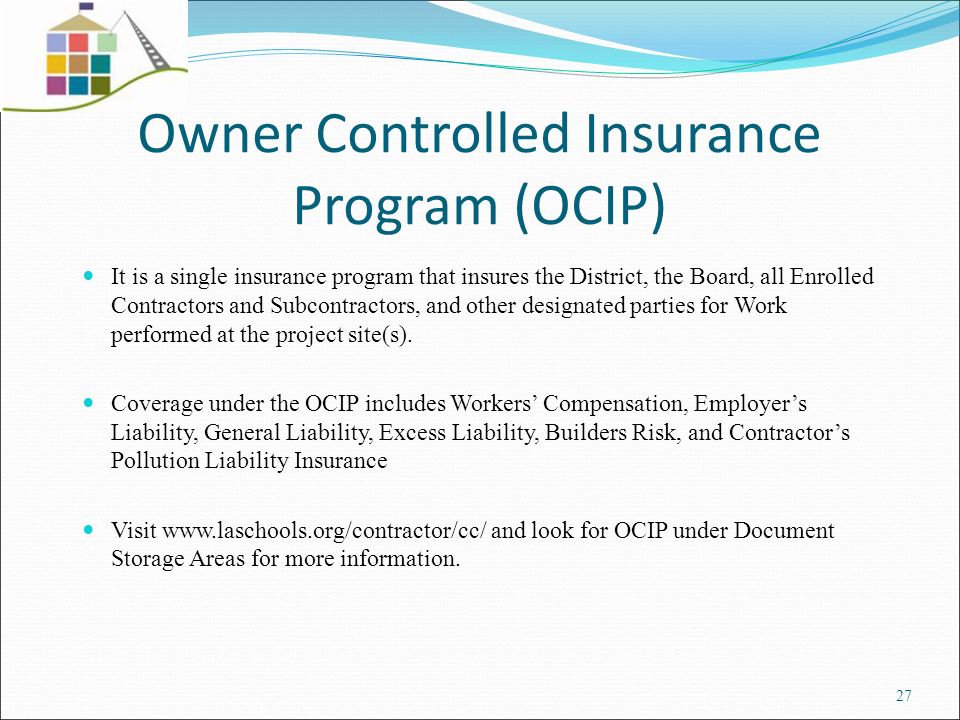OCP insurance definition sets the stage for this enthralling narrative, offering readers a glimpse into a story that is rich in detail with formal and friendly language style and brimming with originality from the outset.
OCP insurance, also known as Owners and Contractors Protective Liability Insurance, is a crucial policy for businesses. It provides coverage for third-party bodily injury and property damage claims arising from ongoing operations. Understanding the intricacies of OCP insurance is vital for businesses to protect themselves from potential liabilities and risks.
Definition of OCP Insurance

OCP insurance, which stands for Owner’s and Contractor’s Protective Liability Insurance, is a type of liability coverage that provides protection for business owners and contractors working on construction projects.
Coverage Provided by OCP Insurance
- Protection against bodily injury and property damage claims
- Legal defense coverage for lawsuits related to the construction project
- Coverage for damages caused by the negligence of subcontractors
- Peace of mind for business owners and contractors by transferring the risk of liability
Types of Businesses that Utilize OCP Insurance
OCP insurance is commonly utilized by businesses involved in the construction industry, including:
- General contractors
- Subcontractors
- Construction project owners
- Real estate developers
Importance of OCP Insurance

Owners and Contractors Protective (OCP) Insurance plays a crucial role in protecting businesses from potential risks and liabilities that may arise during construction projects. It provides coverage for third-party bodily injury or property damage claims, giving businesses the financial security they need to operate confidently.
Why Businesses Need OCP Insurance
OCP insurance is essential for businesses involved in construction projects as it offers specialized coverage that general liability insurance may not provide. It helps protect businesses from legal claims and financial losses that can result from accidents or mishaps on the job site.
- Example: If a subcontractor working on a construction site accidentally damages a neighboring property, OCP insurance can cover the costs of property damage claims filed by the third party.
- Example: In the event of a construction-related injury to a third party, OCP insurance can help cover medical expenses and legal fees associated with the claim.
Comparison with Other Business Insurance
While general liability insurance provides coverage for a broad range of risks, OCP insurance is specifically tailored to the unique needs of construction businesses. Unlike other types of insurance, OCP insurance focuses on protecting businesses from liabilities that arise from construction projects, making it a critical component of a comprehensive risk management strategy.
Key Features of OCP Insurance

Owner Controlled Insurance Programs (OCIP) or Contractor Controlled Insurance Programs (CCIP) have several key features that set them apart from traditional insurance policies.
Limits of Liability and Coverage Options
An OCP insurance policy typically provides coverage for all enrolled contractors and subcontractors on a construction project. This means that all parties involved are covered under the same policy, streamlining the insurance process and reducing potential coverage gaps. The policy usually includes general liability, workers’ compensation, and excess liability coverage.
Differences from General Liability Insurance
One of the main differences between OCP insurance and general liability insurance is that OCP insurance is project-specific. It is tailored to cover all parties involved in a particular construction project, while general liability insurance is more general in nature and may not provide the same level of coverage for all contractors and subcontractors. OCP insurance also typically offers higher limits of liability than traditional policies.
Claims Process for OCP Insurance
When it comes to filing a claim under OCP insurance, businesses need to follow a specific set of steps to ensure a smooth process. In this section, we will Artikel the key steps involved in filing a claim under OCP insurance and provide tips for businesses to navigate this process effectively.
Steps in Filing a Claim under OCP Insurance
- Notify your insurance provider: The first step in filing a claim is to notify your OCP insurance provider about the incident or claim.
- Gather necessary documentation: Collect all relevant documentation, such as contracts, invoices, and any other evidence related to the claim.
- Submit the claim: Fill out the necessary claim forms provided by your insurance provider and submit them along with the supporting documentation.
- Cooperate with the investigation: Your insurance provider may conduct an investigation to validate the claim. Be prepared to cooperate and provide any additional information if required.
- Receive the claim decision: Once the investigation is complete, you will receive a decision on your claim from the insurance provider.
Tips for a Smooth Claims Process with OCP Insurance
- Understand your policy: Familiarize yourself with the terms and conditions of your OCP insurance policy to ensure you meet all requirements when filing a claim.
- Act promptly: Notify your insurance provider as soon as possible after an incident to expedite the claims process.
- Document everything: Keep detailed records of all communications, documentation, and interactions related to the claim for your reference.
- Stay in communication: Maintain open communication with your insurance provider throughout the claims process to address any questions or concerns promptly.
Common Challenges when Filing OCP Insurance Claims, Ocp insurance definition
- Insufficient documentation: Inadequate or missing documentation can delay the claims process. Ensure you have all necessary documents to support your claim.
- Policy misunderstandings: Misinterpreting the terms of your OCP insurance policy can lead to claim denials or delays. Seek clarification if needed.
- Delays in notification: Failing to notify your insurance provider promptly can result in complications during the claims process. Act swiftly after an incident.
Closing Notes: Ocp Insurance Definition
In conclusion, OCP insurance definition sheds light on the essential aspects of this specialized insurance policy. By grasping its significance and key features, businesses can navigate potential risks with confidence and ensure adequate protection.
User Queries
What does OCP insurance stand for?
OCP insurance stands for Owners and Contractors Protective Liability Insurance, providing coverage for third-party claims.
Why do businesses need OCP insurance?
Businesses need OCP insurance to protect themselves from liabilities arising from ongoing operations and potential third-party claims.
How does OCP insurance differ from general liability insurance?
OCP insurance specifically covers liabilities related to ongoing operations, while general liability insurance provides broader coverage for various business risks.
